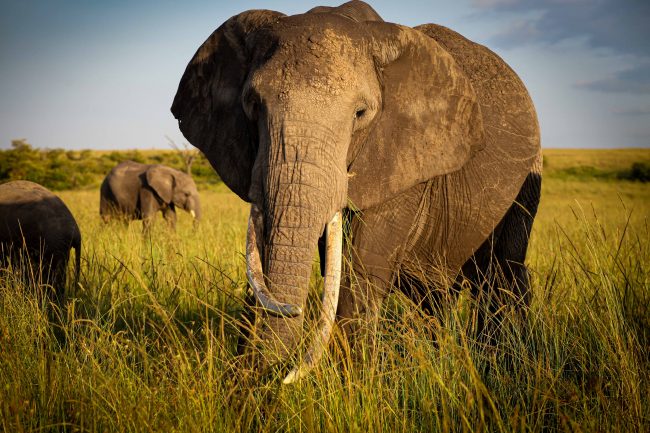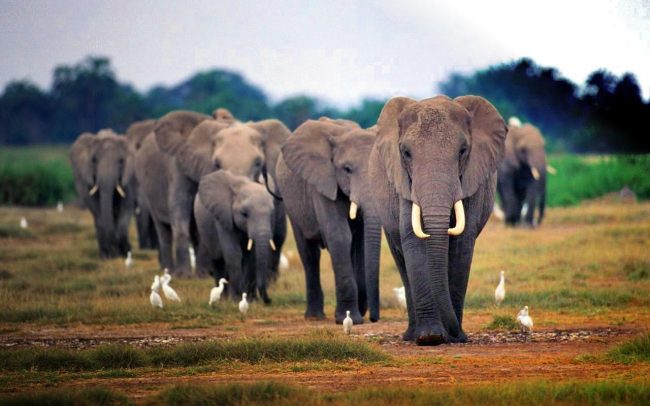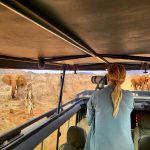Written by Zara Diab, Edited by Anne Dillon
Wildlife crime leaves no country and no person unscathed, and with the recent update to the IUCN Red List of Threatened Species highlighting the growing urgency to save our elephants, our motivation to take action is clearer than ever. Now is the time to take a stand, not only to benefit our elephants, our biodiversity, and our earth’s climate, but also human health, national security, and socioeconomic development. Supporting the Ivory-Free Canada Coalition is a crucial step for us all.
As we set our sights on the road to recovery from the COVID-19 pandemic, both on an individual and global scale, we have the unique opportunity to rebuild our world, and to do it better. An essential way for us to emerge stronger is by using this pivotal moment in time to address our other pandemic: transnational wildlife crime. The issue of wildlife trafficking continues to rise in our public consciousness and political agendas, as its negative implications for other global concerns — including climate change, preservation of biodiversity, security, and public health — become more apparent. Today is the 10th Anniversary of the annual World Elephant Day campaign, and on this day let us turn our attention to one of the wildlife species that’s the hardest hit: elephants.
March 2021 saw the International Union for Conservation of Nature (IUCN) update its Red List of Threatened Species with increasingly dire status for our African elephants, and now lists all three of our elephant species. The Red List continues to classify the Asian elephant as endangered and now includes both African elephant species on the list. The African savannah elephant — whose population has fallen 60 percent over the last 50 years — is now classified as endangered, and more staggeringly still, the African forest elephant — whose population has fallen 86 percent over 31 years — is now classified as critically endangered. One of the biggest threats to our elephants is poaching; we are massacring these beautiful animals at a rate higher than their birth rate. The increased appetite for material trinkets drives demand for ivory as a status item and for luxury products, making elephants a highly sought-after target for wildlife traffickers.
Although elephant habitats are specific to Asia and Africa, virtually every country plays a role in perpetuating the transnational trafficking of ivory. The 2020 World Wildlife Crime Report (WCR), published by the United Nations Office on Drugs and Crime (UNODC), identified involvement of 150 citizenships, proving that it is indeed a global issue. The WCR recommends a holistic approach to combating transnational wildlife crime, which includes “robust research and analysis,” “consistent legislation within countries and across regions,” and “public awareness” to gain support and reduce the demand for trafficked wildlife products such as elephant ivory.
It may come as a shock to learn that the sale of ivory in Canada is still legal today. With the knowledge that consistent legislation is key to eliminating the potential for loopholes in which wildlife trafficking continues to thrive, we as Canadians must take action now to ban the importation, domestic sale, and exportation of elephant ivory through our borders. Elephanatics — a Vancouver-based elephant advocacy organization — is one of the groups that has been working hard to make this happen. After overwhelming support for a petition on this issue, which they generated in 2018, Elephanatics joined forces with other Canadian wildlife and elephant advocacy groups fighting the elephant ivory crisis and illegal wildlife trade. In 2019 these groups, which include Humane Society International, the Jane Goodall Institute Canada, World Elephant Day, and the Rhino & Elephant Defenders (formerly Global March for Elephants & Rhinos Toronto) formed the Ivory-Free Canada Coalition. To date they have garnered over 641,000 signatures on their petition to the government.
Fran Duthie, president and a co-founder of Elephanatics, pleads with Canadians to join the fight. She asserts that there is a “growing global consensus that a complete ban on the ivory trade is necessary to combat elephant poaching. Any legal trade makes it more difficult to detect and eliminate illegal ivory.” Duthie turns to the words of Gandhi to remind us that “if ‘the greatness of a nation can be judged by the way its animals are treated,’ then let Canada be judged as a nation that complies with compassion and commitment to end the trade in elephant ivory and save a species.” Duthie explains that Elephanatics came into being because of the determination, strength, and tenacity of three women fuelled by passion and commitment. Those three women were herself, Tessa Vanderkop, and Leanne Fogarty. She says that as a society and as individuals we need to adopt an attitude of genuine caring for all sentient beings. An attitude where all things matter — not just humans.
Similarly, Tessa Vanderkop, vice president of Elephanatics, adds that the issue is devastating and can feel overwhelming, prompting people to think that they don’t know what to do or where to begin. “Now is the time we can all take action as individuals and as collaborators to ensure there is a future for keystone species such as elephants,” she says. “We can all do something.” She urges all Canadians to participate by signing the petition to our government.
Another Ivory-Free Canada Coalition member, Michael Bernard, who is the deputy director of Humane Society International/Canada, also took this opportunity to urge Canadians to sign the petition and participate in the discussion. He explains that “in keeping with its commitments to preserve global biodiversity and end human-induced extinctions, the Canadian government has launched a crucial public consultation” in which Canadians can voice their support to abolish the ivory trade. He cautions that we are at a crucial point in our history, in which we have the power to change things for the better: “Canada is at a crossroads and the actions we take now to protect African elephants will be remembered for generations to come.”
On an encouraging note, the 2020 WCR contends that the most revolutionary policy change in the four years since its last report in 2016 occurred in the trafficking of ivory. Several of the largest legal domestic markets — including those in China, the US, France, the Philippines, and Singapore — were introduced to severe restrictions. At about the same time, illicit markets declined, potentially due to a loss of investor confidence, resulting in more supply than demand. The report notes that “very large seizures of both ivory and rhino horn were made in 2019, which is likely to be a record year once all the data are in […] the source of this ivory was likely stockpiles, exported before prices decline further still.” The drop in ivory prices following the diminished demand as a result of restrictive legislation is an encouraging sign. It indicates that tighter restrictions and wider awareness does have a positive impact on combating the trafficking of ivory, and by extension poaching, followed by elephant deaths, biodiversity loss, climate change, and so on. For this reason, Canada must not wait any longer to ban the ivory trade.

Photo Credit: Mara Elephant Project
Over half of the African Elephant population decline is due to losses in the United Republic of Tanzania, according to the 2020 WCR. Between 2006 and 2015, for example, Tanzania’s elephant population decreased sharply, from nearly 136,000 to just over 50,000. Since then, Tanzania has taken action to increase its efforts against poaching and wildlife trafficking, including through its National Ivory Action Plan (NIAP). Encouragingly, this work has been yielding positive effects.
In order to secure a lasting and growing impact from these positive results, the rest of the world must join in. As James A. Baker III and Hillary Rodham Clinton articulated in their article for the Washington Post on July 26, 2021, “the growth of wildlife trafficking by sophisticated criminal syndicates has heightened our conviction that the world must speak with one voice.”
Patricia Sims, the Canadian founder and executive director of World Elephant Day, agrees. As an annual awareness campaign, World Elephant Day brings various elephant organizations, advocates, the world’s governments, and the global public together on the critical issues that are threatening the survival of elephants today. “On this 10th Anniversary of World Elephant Day, we have seen how, over the past decade, the world can successfully unite on the issue of elephant conservation so that real change is affected. These positive actions bring awareness to the public about the severity and impact of wildlife trafficking and illegal trade. We are seeing steps being taken by some governments to ban elephant ivory sales and enforce stronger legislation against illegal wildlife trade. Hopefully more will follow. As a Canadian I can say it’s Canada’s turn to take a stand. But it doesn’t matter what country you live in; we all share this planet and the loss of any species anywhere affects us all.”
We have the power to step up as Canadians and set an example to pave the way for other countries that are still in the process of banning their ivory trade. That list of other countries is still too long.
In October 2020, Vermont became only the 12th US state to ban the sale of ivory, following the passage of legislation banning the ivory trade in other states including New York, New Jersey, and California. Additional states continue their vigorous struggles to pass similar legislation. Unfortunately, the ivory trade remains legal and active in other key global areas, such as the UK, the EU, Japan and Australia. Huge gaps like these in the quest to dismantle the ivory market allow for loopholes in which transnational ivory trafficking can continue to occur. These loopholes undermine efforts and progress made by the countries who have restricted and shut their markets down, including several notable African countries such as Tanzania.
The UK has detrimentally been a leading exporter of ivory. In 2017, the Environmental Investigation Agency (EIA) revealed that the UK was the largest exporter of ivory globally. Between 2010 and 2015, the UK was reported to have exported 370 percent more ivory than its runner-up — the US. This is why it was deemed to be a crucial step when in December 2018, the Queen gave royal assent to the UK’s Ivory Act. This means that it had cleared both houses of Parliament and that the Queen formally agreed to enact the bill into law. Two and a half years later, however, the Ivory Act has yet to come into force (to actually become law).
According to the International Fund for Animal Welfare (IFAW), the EU is the third largest destination globally for illegal wildlife and plays a key role in the transit of ivory. Although countries including France, Luxembourg, Belgium, the Netherlands, Austria, the Czech Republic, Germany, and Sweden have already introduced stricter legislations on ivory exports, the EU as a whole is still working to pass bans to shut down the ivory market. In May 2018, over 90 members of the European Parliament called for a total ban on the EU ivory trade, and a public consultation held by the European Commission revealed that over 90 percent of respondents (of which there were over 90,000) are in favour of the ban. At the start of this year, the EU introduced proposals for tighter legislation against the ivory trade, however, at this stage, these proposed restrictions have yet to be formally adopted by the European Commission.
Although some social media platforms in Japan have banned the sale of ivory on their sites, such as Yahoo Japan and other e-commerce firms including Rakuten Inc 4755.T and Mercari Inc 4385.T, Japanese demand for ivory and the preservation of their domestic ivory market keeps the trade alive. China, which historically has been a huge consumer of ivory, banned their ivory trade in 2017. However, a 2018 report by Traffic, a wildlife trade monitoring group, revealed seizures of ivory that was being smuggled from Japan into China, serving as a reminder of the acute importance for global solidarity in the fight for the ivory ban.

As regards Australia, since 1989 it has been illegal to import ivory into the country. However, domestic trade within the country exists, although in 2019 its government did declare its intent to ban it. The continuation of Australia’s domestic trade keeps the material desire for ivory alive and encourages consumers to view ivory goods as something to be sought after.
We have placed an arbitrary value on ivory for our luxury products, but in reality the only place that ivory has true purpose and value is on an elephant. It is well known that elephants are a keystone species, acting as engineers in their ecosystems, benefitting several other wildlife species, and maintaining the balance of our earth’s biodiversity. Elephant tusks are not only crucial for elephant survival but are also essential tools to tend to the environment around them. Elephants engage in many behaviours that directly contribute to the preservation and health of their habitat. They clear away areas of forest and savannah to allow light to reach lower plants, dig watering holes that are essential for many species, transport seeds in their dung, provide food to dung beetles, and even clean up after themselves to leave the environments they encounter better than they found them. The health and balance of the natural world relies on elephants, and incredibly, elephants are key players in the fight against another global threat: climate change. A study published in Nature Geoscience in 2019 asserts that the large appetites and feeding habits of African forest elephants leads to more plant mass, which stores more carbon to help mitigate climate change. We need the elephants’ help as much as they need ours. Eliminating one of the largest threats — the ivory market — to these beautiful and highly important creatures will have positive cascading effects for our planet. At the same time, dismantling transnational wildlife trafficking will strengthen vulnerabilities in our national security, strengthen the socioeconomic development of our countries, and have positive implications for public health.
The COVID-19 pandemic reminds us that we humans are a vulnerable species as well. For our own benefit, we must approach our relationships with wildlife in healthier ways to preserve our home and our health. The illegal wildlife trade, which does not go through proper sanitary controls, is not only eroding our planet’s biodiversity and environmental health but can also pose direct threats to human health as a potential source of the spread of zoonotic diseases, for example. Our earth’s biodiversity is highly interconnected, and the loss of one of our planet’s species impacts us globally in countless direct and indirect ways. Every country, including our own, has a role to play in acting to prevent and address these crimes through disruption and deterrence, because every country and every individual’s health is as valuable and vulnerable as an elephant’s tusk.
The Ivory-Free Canada Coalition and the Honourable Johnathan Wilkinson, Minister of Environment and Climate Change, are pushing legislation for an ivory-free Canada. The initiative is already supported by such prominent individuals as Jane Goodall and Canadian celebrities William Shatner, Bryan Adams, Robert Bateman, Margaret Atwood, and many more. This summer, the Canadian government launched a public consultation to hear what we Canadians have to say on the issue. You can make a difference in mere seconds by adding your name to the Ivory-Free Canada Coalition petition and/or emailing in a pre-written letter. As Fran Duthie, president and a co-founder of Elephanatics says, “As long as elephants walk this earth, there is hope.”
Join the effort and support this crucial step toward building a better Canada and a better world for us all. Join the effort and keep our hope alive.
Zara Diab is a Canadian writer and researcher for World Elephant Society and a PhD student in the English and Writing Studies department at Western University. She has been passionate about elephant conservation since the tragic 2016 Earth Day death of Sambo the Asian elephant, who died of heat-exhaustion from being made to carry tourists in Cambodia.
Anne Dillon is the campaign Communications Director of World Elephant Day and manages the list serv for Save the Elephants in Kenya.
________________________________________________________________________________
1. Other states that have enacted similar legislation in addition to Vermont, New York, New Jersey, and California include New Hampshire, Washington, Hawaii, Oregon, Nevada, Illinois, Minnesota, and New Mexico. As well, the District of Colombia passed similar legislation in 2020.
2. For further reading, please see the Canadian government’s July 23, 2021, press release on the issue.



